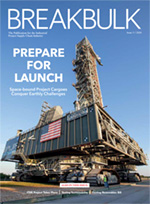Sep 11 | 2020
Digitization Need to Meet New Customer Demands
 By Andrew Raymond
By Andrew RaymondEveryone in the breakbulk market is searching for new efficiencies after the Covid-19 pandemic. Few changes, however, will yield results as quickly as digitizing vital documents that, in their paper form, hold up the release of cargoes, risking heavy demurrage charges and in extreme cases, seizure by customs authorities.
The urgent need to eliminate delays and accelerate shipments makes the case for the digitization of bills of lading, letters of credit and bank guarantees more convincing every minute. No importer of gas turbines or huge cranes wants to find that the documents that enable them to collect their cargo are massively delayed, or maybe even have gone missing. They may have organized authorizations to move the equipment by road or rail, which could be difficult to extend if the bill of lading is unavailable. Since it is a document that confers ownership and is often used as security for financing; its absence prevents collection of the cargo it supports.
Yet delays and mistakes occur all too frequently with paper documents even during normal times. When a country, its banks and ports, are under some form of lockdown or restriction, everyone now knows that these problems are multiplied. Paper documents are no more able to be transported or processed than the cargoes they support.
Faster Transition Needed
As we edge out of the pandemic’s shadow, it is clear that the breakbulk industry has not been swift enough to digitize. In the container market, however, carriers have started to dispense with paper, attracting shippers through super-convenient online portals, automated pricing and fast access to digitized documents including electronic bills of lading, or eBLs.
Apart from the sheer speed of transfer, electronic versions of essential trade documents have the distinct advantage of not being held up at borders or lost during movement restrictions. This has become a vital attribute.
Exchanged on a secure, purpose-built trade digitization platform, trade finance instruments, eBLs and other digitized trade documentation take hours to process instead of the days or weeks for paper equivalents.
This is why breakbulk carriers should invest in paperless systems in the aftermath of the Covid-19 pandemic.
Advanced platforms are ready for integration with emerging blockchain solutions, but the more established open up access to an entire ecosystem of current users that includes carriers, banks, corporates and trade finance specialists.
In a digitized workflow that maps the real-world operation of global trade, automation takes care of the data uploading, while transfer between parties is at the click of a mouse across secure digital networks. Compliance checking, too, can be automated, while encryption and audit trails built into such platforms also reduce the many opportunities for fraud and forgery offered by paper documents.
The integration of secure digital trade finance platforms offers a path to greater efficiency with opportunity for real returns on investment for the breakbulk carrier industry.
Andrew Raymond is CEO of Bolero International.
Image credit: Shutterstock and Carmarmedia.co.uk
